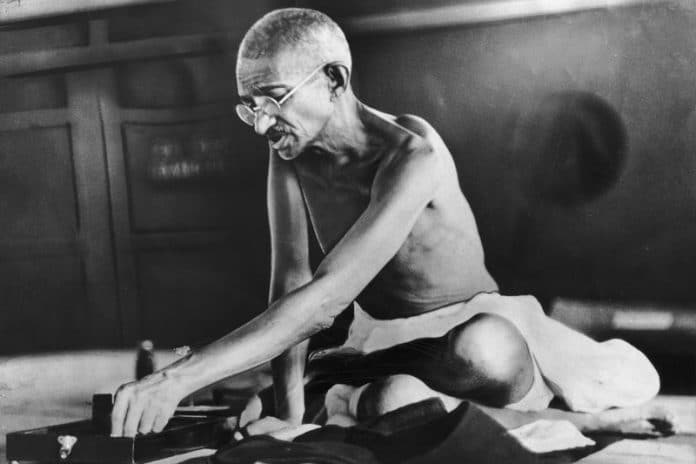Speech by Mwalimu Julius K. Nyerere, Chairman of the South Center, at the Gandhi Peace Prize Ceremony, New Delhi on 27 January 1996.
‘THEN GANDHI CAME’
Dear President, Dear Vice President, Dear Prime Minister, Honorable Members, and Friends.
Mahatma Gandhi is among the most rare people to ever live. He was one of those people whom God sent to the earth every few centuries,
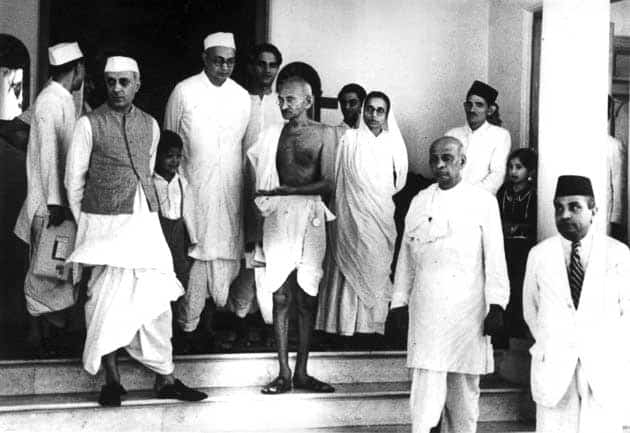
to remind us of the meaning of life, the honor and responsibility of being human. Nehru, while recounting the struggle of the Indian National Congress against the British Raj, introduced Gandhi with a simple but significant sentence: “then Gandhi came.” As Gandhi enters history, the regime is challenged and changed.
Mahatma Gandhi did to his people what the Jews of the day expected Jesus to do to them, but Jesus did not do so: he led the liberation struggle against the ruling empire. For that, Gandhi was not unique. He was one of the many leaders who led the liberation struggle in India, and other parts that were under the rule of Western empires that collapsed in this century and last.
Gandhi’s diversity lies in his life and the methods he used and chose to be his principles. These methods make the message of his life not just for India, but a message that suits every human being wherever he is. His message lies in abandoning the use of violence as a means of counteracting evil; in his movements and good deeds during the struggle against oppression and injustice; in his methods of recognizing the poor and the oppressed everywhere; and in general, the quality and conduct of his life. These things do not place him in the category of redeemers of the body, but in the group of those redeemers of the human spirit. And spiritual liberators in general care for the oppressed and the oppression itself. Concerned about all people, Gandhi falls into the category of the best teachers, the most moral people, and the founders of religion even though he denied that he was a religious teacher and completely opposed the establishment of organizations or systems in his name.
To say that my receiving of this award is a great honor would be an understatement. “Gandhi” means “Peace”. Not for that or for anything I deserve my name to be associated with Mahatma Gandhi. It is true I am not a violent person; but it is not true that I am a philosopher of peace to the extent that Mahatma Gandhi was. It is true that many of us in Africa used peaceful methods to demand the independence of our countries, and in Tanzania we succeeded in gaining independence without resorting to violence. But we never stopped thinking about the decision to use violence if we were forced to do so. In South Africa where Gandhi had begun to use the Satyagraha tactic – the African National Congress party imitated this tactic and applied its policy of non-violence in the struggle, and they held that position for decades. However as happened elsewhere, also in South Africa we found ourselves unable to continue using this method. We felt that we had no other choice and found ourselves turning in the direction of the armed struggle.
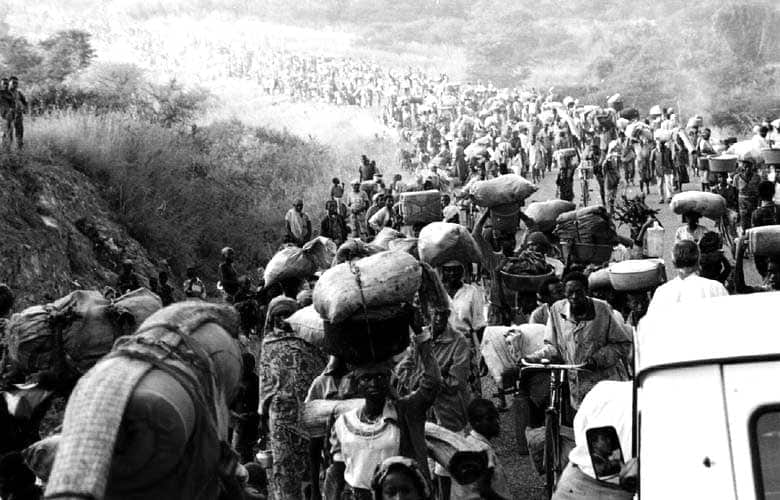
This is an ongoing problem. In Rwanda in 1994, we witnessed the horrific massacre of hundreds of thousands of people, and the number probably reached one million. What should we do as an African community and the world at large if things like this happen? Gandhi certainly would not have advised us that it is okay not to take action and just watch the killings continue in Rwanda. When the massacre had already begun, was there any way to stop it without resorting to force?
These questions show why Satyagraha’s Philosophy has always been a problem for me. In the personal life of man, one realizes that failure to take the path of peace is a moral collapse and a weakness. My problem lies in the social sphere. I recognize the moral value of using the peace process in resolving social and political conflicts. I realize that the use of violence has caused great suffering for the oppressed. But I also see there is a limit to the use of the path of peace. I recognize the possibility of ending peace talks or mediation without eliminating existing injustices. In a situation like this, what action should the community or country take? How can a community or country be prepared to be slapped on the other cheek? But, Gandhi still said that you must do what is right no matter what happens to you, to others, and to him as well. And what is right is always to oppose injustice in a peaceful way.
However, even when I confess my dissatisfaction with this philosophy, in me I know that Gandhi was right. When the oppressor uses force and the oppressed retaliate by force this situation creates and illustrates a disease in social relations. Resisting the demon of injustice in a moral and just manner, and by doing so without resentment or vengeance is the only real and effective way to end injustice. Justice and peace come when the oppressor testifies and accepts the truth, the Bible says “The truth sets a man free.” So even in the social sphere, I agree with Gandhi that using a violent approach in a struggle is an admission of failure. It does not solve the fundamental problem of injustice or the end of suffering.
What I am trying to say is that Gandhi was stronger and more stable than I could be. For him, what is right will always be right. I would be right to say that I can tolerate but not more tolerant when it comes to doing what is morally right when it involves oppression and the suffering of others without the hope of reform. There is still a question for me: Is there a possibility of moral diversity when it comes to personal and social issues? Society is individuals fellowship.
But you, Mr. Prime Minister, said in a letter to me that the goal of the “Gandhi Peace Prize for Social, Economic and Political Change through Peace” is to promote Gandhi’s values throughout the world. For me, the essence of ethics is to accept the responsibility to work for peace through justice and thus bring dignity to humanity, without any grievances. Also do this with love, without hatred or bitterness. In that context, individual failure to follow Mahatma Gandhi’s conduct can be a way to encourage others to do better.
Mahatma’s firm belief in the principles of Satyagraha enabled India to gain its independence by using a very small amount of violence and
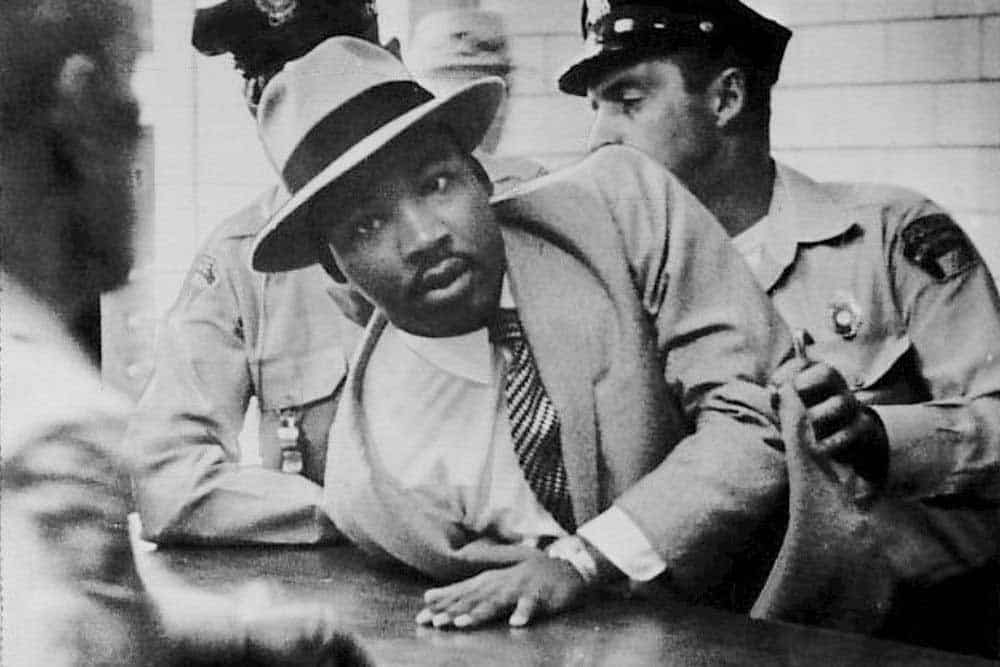
persecution. His violent death cannot make Satyagraha invalid. This was the impetus for the struggle for equality led by Martin Luther King in the United States. The United Nations Convention on Human Rights, and all subsequent conventions, have much in common with that concept. All use of violence and terrorism in today’s world has helped to raise awareness of oppression and hatred, more than it would have been without Gandhi’s teachings. If his values and teachings were to become more widespread, more understandable, then it would be fair to hope that the hate-mongering system will continue to decline and reduce violence.
Dear Chairman, so far there has been a greater awareness and movement aimed at opposing repression in the field of politics and constitution than in the economy and social spheres. But to me I feel like these two aspects are the ones that have the most widespread and obvious oppression. The fact is, conflicts often arise from poverty, which in turn leads to the loss of civil rights in society.
If a man or woman has no way of getting food or feeding their children, or having a way to protect themselves against the weather, or having decent clothing, it is absolutely impossible for them to have self-respect; and it is very rare for them to be given the same respect as other human beings. In our cities and rural areas there are millions of people living in a deep abyss of poverty; there are millions of others who, by begging, stealing, or committing crimes, are struggling to survive in that abyss of poverty.
Mahatma Gandhi administered justice to the poor. He took action against injustice. And he stressed that the measures should include those who are suffering because of injustice so that they can gain hope and respect from the struggle. He also saw the need to rebuild self-esteem between them and the community through productive and educational activities at large. For example, a popular spinning wheel, hands close together, making Khadi popular as a national cause.
I do not think Gandhi saw this movement as the solution to the oppression of poverty. Except he focused on a basic theory in his movement: that people are the target of political, social and economic institutions in any society. And it is only through peaceful means that justice can be achieved. He was also saying that if the economy does not address the problems of the poor, then it will let oppression and injustice continue.
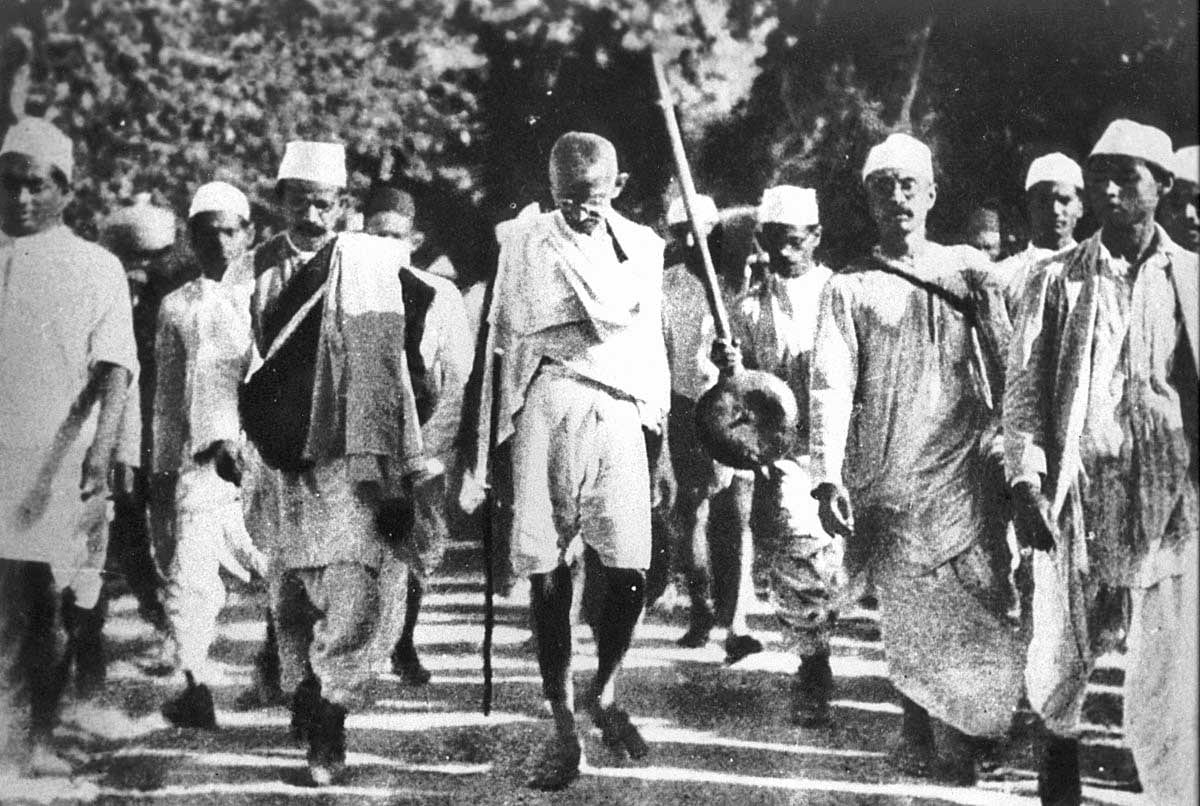
I suggest that the principles of Satyagraha and Swadeshi have a lot to teach us about proper economic and social strategies in developing countries, as well as policies that we can consider applying. No one is actually advocating the return of the ancient imaginary era with a simple economic structure – where in reality it was an era of insecurity, insecurity and worries. Nor is there any intention for third world countries to oppose the benefits of industrial and computer development.
All developing countries have agreed that there is a need to transform our poor economy into a modern one so that our people can have access to education, better health care, and a better life without much hardship. The more our governments care about the poor, including the state of poverty in the country, the more barriers to poverty alleviation, the more we call for change for the better.
But if poverty is our biggest concern, we need to think more about what we are aiming for and what methods to use to achieve that goal. For example, our countries still do not have the capacity to provide technical education and training to all people, or to create other sources of opportunities that can generate significant revenue. Or even offer small payments to the unemployed. In a situation like this, what are we doing when a public or private institution launches a new large-scale production business that can produce twice as much but reduce the amount of manpower needed in the old factory? This shows that in this process of modernization, we have deprived many people of the opportunity to work in the new factory as well as others in the old and other small factories. Is that human development?
In our environment unemployment, including self-employment, can be a matter of life and death. For us, it means there is a need to address the issue of helping people to support themselves by expanding the scope of small-scale activities and those that require less capital in production.
However, it is unfortunate that the answer to that mystery is not as simple as that. No country is self-sufficient in all the goods and services needed to improve the living conditions of its poor people, let alone improve infrastructure and build self-reliance in the future. The country must export goods and services in order to be able to purchase other goods or services needed for human development. How can a country compete in the global market against quality products while itself is selling cheap or expensive products compared to those produced with high-tech alternatives? In practice, without modern technology, the number and status of the poor could be worsened, while the capacity of the government to serve them declines at the same time.
It is easy for activists and those who advocate the poor to criticize the government for being flexible or for being inconsistent towards modernity! It is easy for me to say that an increase in GDP figures does not help people in need of daily food, especially if the increase goes hand in hand with an increase in the number of poor people. It is also easy to talk about the conflicting needs among smallholder farmers who are experiencing declining yields, and the huge increase in demand for affordable food for the urban poor as a growing population is forcing people to leave their lands.
The key question here, is how to balance the short-term and long-term needs of the poor; Criticism is simple, it is very difficult to keep the required balance in the context of the presence of insufficient resources.
Nor do our governments have unlimited freedom at all levels when it comes to implementing economic issues for the benefit of the poor. More than ever before, whether we like it or not, all our countries are economically connected to other parts of the world; we cannot avoid participating in the global economy. And the world includes rich and poor countries, industrialized and low-productive, those advanced in science and technology and those left behind.
In the international arena the developed world has the power to make decisions in all areas and to decide whether there is a need to end oppression against the poor. These countries are the ones that have developed the rules of the game, and they are the ones who have the power to make those laws apply against weak opponents. What is claimed that the global market operates independently, depends on their decisions; and there are also times when the market operation is stopped when they feel it does not meet their expectations! It is also under their leadership that international organizations have become so large and powerful that even the most industrialized countries can no longer control the performance of such organizations.
Without unity, poor, small, or weak countries will not be able to compete with the activities of the unregulated global economic system. Developing countries are often unable to prevent even their own policies that are targeted at helping the poor, unable to be oppressed by international organizations or powerful governments of developed countries if such measures are considered a threat to them. In general terms, developing countries cannot even guarantee that developed countries adhere to international laws that have been agreed to by themselves.
Referring to this fact about the global economy, I have not forgotten the economic progress made by Malaysia and South Korea, nor do I mean that any developing country, even the poorest of us, has no power to do anything against the injustices brought on by poverty and suffering upon its people who are poor. The political will to bring justice to the poor and the oppressed is self-sufficient in bringing about great results. And we all have a lot to learn from those countries that have made great strides. When necessary we can redistribute land or production methods based on equality, and in other ways we can reduce income and power disparities between rich and poor in our countries. And high quality standards we can maintain the oversight and leadership of the government in our economies even if we allow greater freedom in the private sector.
Gandhi’s values require our policies to give our people the confidence to afford a better life through their efforts, rather than focusing more on the needs of the rich and powerful in our country. These principles require us to help the poor so that they can support themselves through cooperatives and basic production even if it is the production of cards or cheap products made from raw materials available in those areas. Mahatma-inspired values call for our policies to be directed at reducing the gap between rich and poor in order to promote social harmony and cooperation, rather than to promote personal competition and selfish ambitions.
Although for any developing country, the scope for reform is small now compared to ten years ago. And yet the scope continues to decline with each new technological discovery in developed countries. If we are to fight the scourge of poverty, developing countries have no choice but to work together and with a sincere desire to develop cooperation in trade, research, finance and broadening knowledge between them. We need to build the foundations of self-reliance of our nations through cooperation and strengthen the self-reliance alliance of the South (Tip: explore our other article “South South Cooperation: Third World Solidarity” to get more details about cooperation among Southern hemisphere countries).
Dear chairman, I have spoken on this subject many times: this approach to development was the basis of the agreement and recommendations of the South Commission. And theoretically there are few leaders in developing countries who disagree in uniting to be self-reliant and to bring about human development.
However, implementing such a policy is not easy. There are inevitable barriers to developing partnerships that will benefit all partners, especially when it comes to people with different cultures, languages, and levels of development. Secondly, we need to focus on how the poor and the uneducated among our people will be able to understand the connection between their daily worries and government priorities as well as its international activities. It is the same as expecting a patient who is dying of a fever, to understand why his doctor spends his time and money studying the behavior of mosquitoes instead of giving him medication that will make him feel better.
At this point, when we realize that the root of economic oppression either through practice or research is that our development options are constrained by the implementation of the policies of powerful nations, the lesson of life and Gandhi’s work shows that we must accept the challenge. With the solidarity of the Southern countries in international dialogue, we can unite the power of division between our developing countries to create the strength of our numbers, and also to emphasize justice on our part. On that basis we can agree to participate in, or refuse to participate in, proposals from developed nations that depend on whether or not they support or prevent the fight against poverty. And by virtue of our goal, as well as the desire for peace and human rights, we can form allies within developed nations, or among them.
Gandhi’s first requirement was that the oppressed be recognized for the evil they were being treated; the second requirement: is that we seek the truth behind the situation, and its source, and the third requirement is that we take action against oppression through peaceful means, and continue to do so until oppression ceases.
The oppression and violation of justice resulting from poverty has already been identified, its roots, internally and externally are well understood. But action has not been taken.
Individually each of us, as a worker using hands or brain and as leaders, we have a responsibility to take action against the oppression that results from poverty, ignorance and mental illness as well as the body. To the best of our ability, we must take action in all aspects of life, or do whatever seems right in our own eyes, our understanding as human beings, as well as our opportunities. Nor is it public recognition or lack of awareness that can be used as an excuse for not making the effort. Without violence or hatred, we must work for a world where all human beings can live in peace and justice. As human beings and allies, we must do our best in every situation. No one expects us to do more than we can handle!
Thank you!
For more Nyerere speeches click here!

























